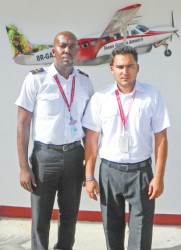At 21 and 26 respectively, Shivram Arjun and Al Fredericks are on the verge of living their childhood dreams. At relatively tender ages they both set the identical career course and fate; good fortune and determination have now brought them to the ideal landing.
In a matter of weeks they will both leave these shores for Miami where they are already enrolled to train and, in a year’s time, qualify as pilots. Afterwards they will return home and rejoin Trans Guyana Airways in their new, exalted positions where they will have to work for a further year toward command status. Then, as far as the two are concerned they would have been reborn.

Arjun’s journey began as a boy living in Industry, East Coast Demerara. He frequented the Ogle Airstrip and took to the flying machines. Enrolment at the Art Williams and Harry Wendt Aeronautical School took him closer to airplanes and after graduating at the top of his class he joined the Caribbean Aviation Main-tenance Service (CAMS), a subsidiary of the Correia Group of Companies.
Fredericks’ journey to where he is today took him through an incomplete tilt at the Guyana Defence Force’s Cadet Officer Course during which he acquired some work-study experience with the Air Corps. Subsequently, he secured a place at Trans Guyana in flight operations.
Both of these young men consider themselves privileged and lucky to be employed with a company that has decided to invest US$200,000.000 in training them in a skill that is highly prized globally and in which, moreover, neither of them has a background.
The two are the third batch of Trans Guyana employees who have been awarded highly competitive company scholarships to train as pilots in a globally respected school. Both concede that the journey was no walk in the park. Fredericks has been selected only after he had applied on two previous occasions. Arjun succeeded on his second attempt.
While they will both be under contract to serve the company for ten years and to repay the respective amounts invested in their training, they are persuaded that they are being given a good deal. As young men from working-class backgrounds, training in a highly prestigious profession financed under conditions that allows repayment at a perfectly reasonable pace is not the sort of deal that comes along every day.
Both young men are mindful, too, that the opportunity has come at a time when their country’s development focus has significantly increased the demand for qualified pilots. There is no doubt that the future of Guyana depends on creating strong and reliable air links between coast and hinterland.








